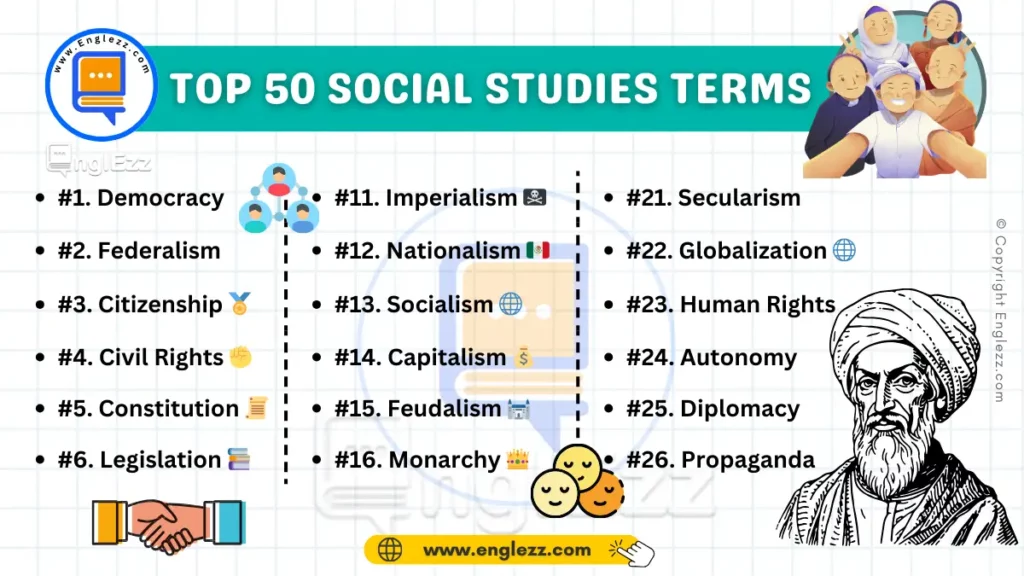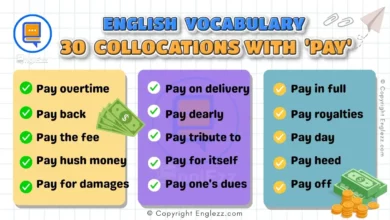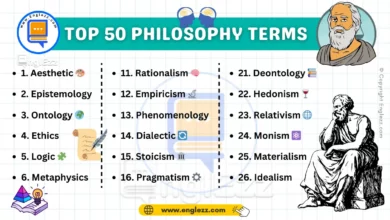Understanding social studies concepts is crucial for students and anyone interested in the field of social sciences. From historical events to sociopolitical theories, social studies terminology plays a key role in grasping complex ideas and participating in informed discussions. In this blog post, we will explore the 50 most common English terms used in social studies, each explained with clear definitions, phonetic transcriptions, and practical examples to enhance your comprehension.
50 Key Social Studies English Terms Explained with Examples for Students
Whether you’re preparing for exams, working on a research project, or simply looking to expand your knowledge, this guide will provide you with the tools you need to navigate social studies with confidence. Dive into these essential terms and discover how they apply to real-world scenarios to deepen your understanding and enrich your studies.
#1. Democracy 🗳️
Definition: A system of government in which power is vested in the people, who rule either directly or through freely elected representatives.
Phonetic Transcription: /dɪˈmɒkrəsi/
Examples:
- In a democracy, citizens vote on major issues and elect officials who represent their interests.
- The United States is known for its democratic system, where elections determine leadership at various levels of government.
#2. Federalism 🏛️
Definition: A political system where power is divided between a central authority and constituent political units, such as states or provinces.
Phonetic Transcription: /ˈfɛdərəˌlɪzəm/
Examples:
- Federalism in the United States means that both the federal government and state governments have the power to legislate and enforce laws.
- In a federal system, local governments can make decisions on education and transportation while the central government handles national defense and foreign policy.
#3. Citizenship 🏅
Definition: The status of being a member of a particular country and having the rights and responsibilities associated with that membership.
Phonetic Transcription: /ˈsɪtɪzənʃɪp/
Examples:
- Citizenship often includes the right to vote and run for public office in one’s country.
- Responsibilities of citizenship may involve paying taxes and participating in civic duties.
#4. Civil Rights ✊
Definition: The rights of citizens to political and social freedom and equality.
Phonetic Transcription: /ˈsɪvəl raɪts/
Examples:
- The Civil Rights Movement in the 1960s aimed to end racial segregation and discrimination in the United States.
- Civil rights include freedoms such as speech, assembly, and the right to a fair trial.
#5. Constitution 📜
Definition: A set of fundamental principles or established precedents according to which a state or other organization is governed.
Phonetic Transcription: /ˌkɒnstɪˈtjuːʃən/
Examples:
- The Constitution of the United States outlines the framework of government and guarantees certain rights to its citizens.
- Many countries have their own constitutions that define the structure and powers of their government.
#6. Legislation 📚
Definition: Laws, considered collectively, that are enacted by a legislative body.
Phonetic Transcription: /ˌlɛdʒɪsˈleɪʃən/
Examples:
- New legislation on environmental protection was passed to address climate change concerns.
- Legislation regarding education often includes laws about school funding and curriculum standards.
#7. Sovereignty 👑
Definition: The authority of a state to govern itself or another state without interference.
Phonetic Transcription: /ˈsɒvrɪnti/
Examples:
- National sovereignty means that a country has the power to make its own laws and policies without external control.
- The concept of sovereignty is important in international relations, where countries recognize each other’s right to self-govern.
#8. Judiciary ⚖️
Definition: The judicial authorities of a country; judges collectively.
Phonetic Transcription: /dʒuːˈdɪʃəri/
Examples:
- The judiciary interprets laws and ensures they are applied fairly in court cases.
- A strong judiciary is essential for upholding justice and protecting individual rights.
#9. Republic 🏛️
Definition: A form of government in which the country is considered a “public matter” and the head of state is an elected or nominated president.
Phonetic Transcription: /rɪˈpʌblɪk/
Examples:
- France is a republic where the president is elected by the people rather than inheriting the position.
- In a republic, the leader’s authority is derived from the consent of the governed, not by monarchy.

#10. Colonialism 🌍
Definition: The practice of acquiring and maintaining colonies or territories, often by force or coercion, and exploiting them economically.
Phonetic Transcription: /kəˈləʊniəlɪzəm/
Examples:
- Colonialism by European powers in Africa led to significant political and economic changes in the continent.
- The effects of colonialism are still felt today in many former colonies, affecting their development and relations with former colonizers.
#11. Imperialism 🏴☠️
Definition: A policy of extending a country’s power and influence through diplomacy or military force.
Phonetic Transcription: /ɪmˈpɪəriəlɪzəm/
Examples:
- The British Empire’s imperialism led to the expansion of its territories across various continents.
- Imperialism often involves the imposition of the dominant country’s culture and values on the colonized regions.
#12. Nationalism 🇲🇽
Definition: A political ideology that emphasizes the interests of a particular nation, often in opposition to foreign influence.
Phonetic Transcription: /ˈnæʃənəlɪzəm/
Examples:
- Nationalism can lead to a strong sense of pride and identity among a country’s citizens.
- The rise of nationalism in various countries can sometimes lead to conflicts with neighboring nations.
#13. Socialism 🌐
Definition: A political and economic system in which the means of production, distribution, and exchange are owned or regulated by the community as a whole.
Phonetic Transcription: /ˈsəʊʃəlɪzəm/
Examples:
- Socialism advocates for equal distribution of wealth and resources among the population.
- Many Scandinavian countries implement socialist policies to provide extensive social services and reduce inequality.
#14. Capitalism 💰
Definition: An economic system where private individuals rather than the state own and control property and businesses.
Phonetic Transcription: /ˈkæpɪtəlɪzəm/
Examples:
- Capitalism encourages competition and innovation by allowing businesses to operate for profit.
- In a capitalist system, the market determines the prices of goods and services based on supply and demand.
#15. Feudalism 🏰
Definition: A medieval European social system in which land was held by lords and vassals in exchange for military service.
Phonetic Transcription: /ˈfjuːdəlɪzəm/
Examples:
- Feudalism structured society into different classes, including lords, vassals, and serfs.
- During the feudal era, lords granted land to vassals who pledged loyalty and military support.
#16. Monarchy 👑
Definition: A form of government where a single person, the monarch, rules the country, often for life and by hereditary right.
Phonetic Transcription: /ˈmɒnərki/
Examples:
- The United Kingdom is a constitutional monarchy where the monarch’s powers are limited by law.
- Absolute monarchies grant the ruler total control over the government and state affairs.
#17. Oligarchy 👥
Definition: A form of government in which power resides in the hands of a small, elite group of individuals or families.
Phonetic Transcription: /ˈɒlɪɡɑːki/
Examples:
- Oligarchies can arise in countries where political power is concentrated among a few wealthy or influential families.
- In an oligarchy, decision-making is often limited to a select group rather than involving the general population.
#18. Authoritarianism 🚨
Definition: A governing system where a single leader or a small group holds significant power, often with limited political freedoms and central control.
Phonetic Transcription: /ɔːˌθɒrɪˈtɛərɪənɪzəm/
Examples:
- Authoritarian regimes often restrict freedom of speech and suppress political dissent.
- Countries with authoritarian governments may have centralized control over media and public opinion.
#19. Totalitarianism 🕵️
Definition: An extreme form of authoritarianism where the state seeks to control nearly every aspect of public and private life.
Phonetic Transcription: /təʊˌtælɪˈtɛərɪənɪzəm/
Examples:
- Totalitarian states often use propaganda and surveillance to maintain power and control over the population.
- Historical examples of totalitarianism include Nazi Germany and Stalinist Soviet Union.
#20. Communism 🔴
Definition: A political and economic ideology aiming for a classless society in which the means of production are owned communally and private property is abolished.
Phonetic Transcription: /ˈkɒmjʊnɪzəm/
Examples:
- Communism seeks to eliminate the gap between rich and poor by distributing resources equally.
- In theory, communism provides for everyone’s needs, but in practice, it has faced challenges in implementation.
#21. Secularism 🌍
Definition: The principle of separating religion from political, social, and educational institutions.
Phonetic Transcription: /ˈsɛkjələrɪzəm/
Examples:
- Secularism advocates for government policies that are not influenced by religious beliefs.
- Many modern democracies adopt secularism to ensure equal treatment of all religions and beliefs.
#22. Globalization 🌐
Definition: The process by which businesses, cultures, and governments become interconnected and interdependent through trade, communication, and technology.
Phonetic Transcription: /ˌɡləʊbəlaɪˈzeɪʃən/
Examples:
- Globalization has led to increased international trade and cultural exchange between countries.
- The rise of global communication technologies has made it easier for people to connect across borders.
#23. Human Rights 🌏
Definition: The basic rights and freedoms to which all humans are entitled, regardless of nationality, ethnicity, or religion.
Phonetic Transcription: /ˈhjuːmən raɪts/
Examples:
- Human rights include the right to free speech, education, and a fair trial.
- Organizations like the United Nations work to protect and promote human rights globally.
#24. Nationalism 🌍
Definition: A political ideology focused on promoting the interests and culture of a particular nation, often in opposition to foreign influence or control.
Phonetic Transcription: /ˈnæʃənəlɪzəm/
Examples:
- Nationalism can foster a strong sense of unity and pride among citizens of a country.
- However, extreme nationalism can sometimes lead to xenophobia and conflicts with other nations.
#25. Autonomy 🗺️
Definition: The right or condition of self-government, especially in a particular sphere.
Phonetic Transcription: /ɔːˈtɒnəmi/
Examples:
- Regional autonomy allows local governments to make decisions on issues such as education and infrastructure.
- Autonomy is important for indigenous groups seeking to govern themselves and preserve their cultures.
#26. Diplomacy 🌏
Definition: The practice of managing international relations and conducting negotiations between countries.
Phonetic Transcription: /dɪˈpləʊməsi/
Examples:
- Diplomacy involves negotiations to resolve conflicts and promote peace between nations.
- International treaties and agreements are often the result of successful diplomatic efforts.
#27. Propaganda 📢
Definition: Information, especially of a biased or misleading nature, used to promote a political cause or point of view.
Phonetic Transcription: /ˌprɒpəˈɡændə/
Examples:
- Governments and organizations use propaganda to influence public opinion and support their agendas.
- During wartime, propaganda can be used to boost morale and justify military actions.
#28. Sovereignty 🌍
Definition: The supreme authority of a state to govern itself without external interference.
Phonetic Transcription: /ˈsɒvrɪnti/
Examples:
- Sovereignty allows nations to make their own laws and policies without outside intervention.
- The principle of sovereignty is a key concept in international relations and diplomacy.
#29. Revolution 🔥
Definition: A sudden and significant change in political power or organizational structures, often achieved through force.
Phonetic Transcription: /ˌrɛvəˈluːʃən/
Examples:
- The French Revolution led to the overthrow of the monarchy and the rise of a republic.
- Revolutions can result in significant social and political changes, such as the American Revolution’s establishment of the United States.
#30. Tyranny 🏛️
Definition: Cruel and oppressive government or rule where power is concentrated in the hands of one leader or a small group.
Phonetic Transcription: /ˈtɪrəni/
Examples:
- Tyranny often involves the suppression of freedoms and the use of fear to maintain control.
- Historical examples of tyranny include the rule of dictators who oppress their populations and restrict political dissent.
#31. National Identity 🌟
Definition: A sense of belonging to a nation and the shared characteristics that define a nation’s culture and values.
Phonetic Transcription: /ˌnæʃənl aɪˈdɛntɪti/
Examples:
- National identity can be shaped by shared history, language, and cultural practices.
- Events such as national holidays and cultural festivals often reinforce national identity and pride.
#32. Urbanization 🌆
Definition: The process by which cities grow and develop as more people move from rural areas to urban centers.
Phonetic Transcription: /ˌɜːrbənaɪˈzeɪʃən/
Examples:
- Urbanization leads to increased development of infrastructure and housing in cities.
- The growth of cities often results in challenges such as overcrowding and environmental impact.
#33. Economic System 💵
Definition: The system by which goods and services are produced, distributed, and consumed within a society.
Phonetic Transcription: /ˌiːkəˈnɒmɪk ˈsɪstəm/
Examples:
- Different economic systems include capitalism, socialism, and mixed economies.
- An economic system affects how resources are allocated and how wealth is distributed in a society.
#34. Social Stratification 📊
Definition: The hierarchical arrangement of individuals into different social classes based on factors like wealth, education, and occupation.
Phonetic Transcription: /ˈsəʊʃəl ˌstrætɪfɪˈkeɪʃən/
Examples:
- Social stratification can lead to inequalities in access to resources and opportunities.
- Class systems often impact individuals’ social mobility and quality of life.
#35. Civil Society 🏛️
Definition: The collective organization of individuals and groups outside of the government that work to address societal issues and promote public interests.
Phonetic Transcription: /ˈsɪvəl səˈsaɪəti/
Examples:
- Civil society organizations, such as non-profits and advocacy groups, play a role in improving community welfare.
- Civil society can influence government policy and provide services that the state may not address.
#36. Multiculturalism 🌏
Definition: The coexistence of diverse cultures within a society, recognizing and valuing the contributions of different cultural groups.
Phonetic Transcription: /ˌmʌltɪˈkʌltʃərəlɪzəm/
Examples:
- Multiculturalism promotes inclusivity and mutual respect among different cultural communities.
- Cities with high levels of multiculturalism often celebrate various cultural festivals and traditions.
#37. Political Correctness 🗣️
Definition: The practice of avoiding language or actions that could be considered offensive or discriminatory.
Phonetic Transcription: /pəˌlɪtɪkəl kəˈrɛktnəs/
Examples:
- Political correctness seeks to promote respectful and inclusive communication in public discourse.
- Debates about political correctness often revolve around balancing free speech with sensitivity to marginalized groups.
#38. Public Policy 📜
Definition: The principles and guidelines that govern the actions and decisions of government institutions and officials.
Phonetic Transcription: /ˈpʌblɪk ˈpɒlɪsi/
Examples:
- Public policy decisions affect various areas such as healthcare, education, and transportation.
- Policymakers use research and public input to develop policies that address societal needs and issues.
#39. International Relations 🌍
Definition: The study and practice of political and economic interactions between countries.
Phonetic Transcription: /ˌɪntəˈnæʃənl rɪˈleɪʃənz/
Examples:
- International relations involve diplomacy, trade agreements, and conflict resolution between nations.
- Organizations like the United Nations work to address global issues and foster cooperation among countries.
#40. Human Development 🌟
Definition: The process of improving the quality of life and well-being of individuals and communities through economic, social, and educational advancements.
Phonetic Transcription: /ˈhjuːmən dɪˈvɛləpmənt/
Examples:
- Human development focuses on increasing access to education, healthcare, and economic opportunities.
- Programs aimed at human development often address issues like poverty and inequality.
#41. Economic Inequality 💸
Definition: The unequal distribution of wealth and resources among individuals or groups in a society.
Phonetic Transcription: /ˌiːkəˈnɒmɪk ɪnɪˈkwɒlɪti/
Examples:
- Economic inequality can result in disparities in living standards, access to education, and healthcare.
- Addressing economic inequality often involves policies aimed at redistributing wealth and improving social services.
#42. State Sovereignty 🏛️
Definition: The concept that a state has supreme authority within its own territory and is not subject to external control.
Phonetic Transcription: /steɪt ˈsɒvrɪnti/
Examples:
- State sovereignty is a key principle in international law that protects a nation’s right to self-governance.
- Conflicts can arise when external forces or interventions challenge a state’s sovereignty.
#43. Social Justice ⚖️
Definition: The pursuit of fairness and equality in society by addressing and rectifying social inequalities and injustices.
Phonetic Transcription: /ˈsəʊʃəl ˈdʒʌstɪs/
Examples:
- Social justice initiatives focus on issues such as racial equality, gender equality, and workers’ rights.
- Advocacy for social justice often involves grassroots movements and policy changes to promote equitable treatment.
#44. Civic Engagement 🏛️
Definition: The participation of individuals in activities aimed at improving their community and influencing public policy.
Phonetic Transcription: /ˈsɪvɪk ɪnˈɡeɪdʒmənt/
Examples:
- Civic engagement includes activities such as voting, volunteering, and participating in community forums.
- Engaged citizens help shape public policies and contribute to the betterment of their communities.
#45. Global Governance 🌐
Definition: The way international affairs are managed across countries through institutions, policies, and agreements.
Phonetic Transcription: /ˈɡləʊbəl ˈɡʌvənəns/
Examples:
- Global governance involves international organizations like the United Nations that address issues affecting multiple countries.
- Effective global governance requires cooperation and coordination between nations on global challenges such as climate change.
#46. Economic Growth 📈
Definition: The increase in the economic output of a country over time, often measured by changes in GDP.
Phonetic Transcription: /ɪˈkɒnəmɪk ɡrəʊθ/
Examples:
- Economic growth can lead to improved living standards and increased job opportunities.
- Policies that stimulate investment and innovation often contribute to sustained economic growth.
#47. Public Opinion 🗣️
Definition: The collective attitudes and beliefs of the general population on various issues or policies.
Phonetic Transcription: /ˈpʌblɪk əˈpɪnjən/
Examples:
- Public opinion can influence government decisions and policy-making processes.
- Media and surveys often gauge public opinion to understand the views and preferences of citizens.
#48. Civic Responsibility 🛠️
Definition: The duty of citizens to participate in and contribute to the functioning and improvement of their community and society.
Phonetic Transcription: /ˈsɪvɪk rɪˈspɒnsɪbɪlɪti/
Examples:
- Civic responsibility includes activities such as voting, serving on juries, and participating in local organizations.
- Active civic responsibility helps ensure a healthy and functioning democratic society.
#49. International Law ⚖️
Definition: A set of rules and principles that govern relations between nations and international organizations.
Phonetic Transcription: /ˌɪntəˈnæʃənl lɔː/
Examples:
- International law covers agreements on trade, human rights, and conflict resolution.
- Treaties and conventions are examples of international law that guide the behavior of states and international actors.
#50. Cultural Diversity 🌍
Definition: The presence of multiple cultural groups and practices within a society, contributing to a rich and varied cultural landscape.
Phonetic Transcription: /ˈkʌltʃərəl daɪˈvɜːsɪti/
Examples:
- Cultural diversity enhances social interactions and broadens perspectives within communities.
- Multicultural societies celebrate various cultural traditions and foster mutual understanding among different groups.
Medical English Terms Table
| #1. Democracy 🗳️ | #11. Imperialism 🏴☠️ | #21. Secularism 🌍 |
| #2. Federalism 🏛️ | #12. Nationalism 🇲🇽 | #22. Globalization 🌐 |
| #3. Citizenship 🏅 | #13. Socialism 🌐 | #23. Human Rights 🌏 |
| #4. Civil Rights ✊ | #14. Capitalism 💰 | #24. Autonomy 🗺️ |
| #5. Constitution 📜 | #15. Feudalism 🏰 | #25. Diplomacy 🌏 |
| #6. Legislation 📚 | #16. Monarchy 👑 | #26. Propaganda 📢 |
| #7. Sovereignty 👑 | #17. Oligarchy 👥 | #27. Tyranny 🏛️ |
| #8. Judiciary ⚖️ | #18. Authoritarianism 🚨 | #28. Communism 🔴 |
| #9. Republic 🏛️ | #19. Totalitarianism 🕵️ | #29. Revolution 🔥 |
| #10. Colonialism 🌍 | #20. National Identity 🌟 | #30. Tyranny 🏛️ |
Conclusion
Understanding these 50 common social studies terms provides a solid foundation for anyone engaging with social sciences. These terms are not only integral to academic studies but also play a significant role in understanding the complex interplay between political, social, and economic factors in our world. By familiarizing yourself with these concepts, you enhance your ability to analyze current events, participate in discussions, and contribute meaningfully to societal issues.
This comprehensive guide aims to make these terms accessible and practical, offering clear definitions, examples, and phonetic transcriptions to support learning and application. As you continue your journey in social studies, remember that a strong grasp of these foundational terms will serve as a valuable tool in navigating the multifaceted world of social sciences.
Keep exploring, stay curious, and apply these concepts to gain a deeper understanding of the dynamics shaping our global society.









Discover essential social studies terms with clear definitions and practical examples in our latest post! 📚✨ Dive into concepts like Democracy, Federalism, and more—each explained with easy-to-understand definitions and examples. Enhance your knowledge and ace your studies effortlessly. Don’t forget to follow and like @EnglEzz for more insightful content! EnglEzz
.
https://www.englezz.com/50-key-social-studies-english-terms/
.
#Vocabulary #Linguistics #SocialStudies #Education #LearnEnglish #AcademicSuccess #History #Civics